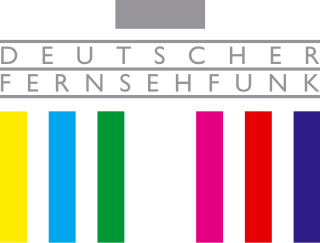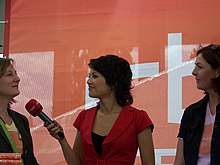The Fernsehturm in central Berlin was constructed between 1965 and 1969 by the government of the German Democratic Republic, or East Germany, as both a functional broadcasting facility and a symbol of Communist power.

ARD is a joint organisation of Germany's regional public-service broadcasters. It was founded in 1950 in West Germany to represent the common interests of the new, decentralised, post-war broadcasting services – in particular the introduction of a joint television network.
Tagesschau is a German national and international television news service produced by the editorial staff of ARD-aktuell on behalf of the German public-service television network ARD.
Das Erste is the flagship national television channel of the ARD association of public broadcasting corporations in Germany. Das Erste is jointly operated by the nine regional public broadcasting corporations that are members of the ARD.

Radio DDR 1 was a radio channel produced and transmitted by Rundfunk der DDR, the radio broadcasting organization of East Germany (GDR). It had a mixed of news and light entertainment schedule, with an emphasis on events in the GDR, and also included regional programming.
Television in Germany began in Berlin on 22 March 1935, broadcasting for 90 minutes three times a week. It was home to the first public television station in the world, named Fernsehsender Paul Nipkow.

Rundfunk Berlin-Brandenburg, commonly shortened to RBB, is an institution under public law for the German states of Berlin and Brandenburg, based in Berlin and Potsdam. RBB was established on 1 May 2003 through the merger of Sender Freies Berlin (SFB) and Ostdeutscher Rundfunk Brandenburg (ORB), based in Potsdam, and is a member of the Association of PSBs in the Federal Republic of Germany (ARD).
Sender Freies Berlin was the ARD public radio and television service for Berlin from 1 June 1954 until 30 April 2003. On 1 January 1992, SFB became the public broadcaster for the whole of reunited Berlin. However, SFB had long had a significant audience in East Berlin for some time before German reunification. On 1 May 2003 it merged with Ostdeutscher Rundfunk Brandenburg to form Rundfunk Berlin-Brandenburg.

Ostdeutscher Rundfunk Brandenburg, based in Potsdam, was the public broadcaster for the German federal state of Brandenburg from 12 October 1991 until 30 April 2003. It was a member organization of the consortium of public-law broadcasting organizations in Germany, ARD.

Rundfunk der DDR was the collective designation for radio broadcasting organized by the State Broadcasting Committee in the German Democratic Republic (GDR) until German reunification in 1990.

SRF 1 is a German-language Swiss television channel, one of three produced by the SRG SSR public-service broadcasting group. The channel, formerly known as SF1, was renamed on 16 December 2012, together with its sister German-speaking TV channels and five radio channels, as part of an exercise aimed at emphasizing their common ownership as well as establishing a shared web presence for all of them.

Michael Kessler is a German actor, comedian and author.
Tagesschau24 is a German free-to-air television channel owned by ARD and managed by Norddeutscher Rundfunk. It was launched on 30 August 1997 as "EinsExtra" before it became the current name on 1 May 2012.

Deutscher Fernsehfunk was the state television broadcaster in the German Democratic Republic from 1952 to 1991.
Franziska Fischer is a German journalist, TV presenter and author.
rbb24 Brandenburg aktuell is the television magazine of Rundfunk Berlin-Brandenburg (rbb) for the state of Brandenburg. The programme is broadcast daily on rbb Fernsehen at 7:30 p.m., while the viewers in Berlin receive the Abendschau. The magazine informs about political and cultural life in Brandenburg and provides background information on special events. Also the sport in Brandenburg as well as homeland stories from Brandenburg are topics of the show. In the early years, national and international reports were shown in Brandenburg aktuell, but these were abolished in 2000 when ORB Fernsehen began simulcasting the main 8:00pm edition of Tagesschau from Das Erste.
RBB Berlin was the third television channel for Berlin, Germany from October 1992 until March 2004. Until May 2003 it was owned by Sender Freies Berlin (SFB), then by its successor, Rundfunk Berlin-Brandenburg (RBB), under the provisional name RBB Berlin. On 1 March 2004, the two previous regional television channels RBB Berlin and RBB Brandenburg were replaced by the new rbb Fernsehen.
RBB Brandenburg was the third television channel for Brandenburg, (Germany) from January 1992 to March 2004. Until May 2003, it was organized by Ostdeutscher Rundfunk Brandenburg (ORB), then by its successor, Rundfunk Berlin-Brandenburg (RBB). On 1 March 2004, the two regional television channels of RBB – RBB Brandenburg and RBB Berlin – were integrated into the new rbb Fernsehen.

Helmar Rudolf Willi Weitzel is a German television presenter, journalist and film producer. He moderated the television programs Willi wills wissen and Willis VIPs. In 2008 he made the movie Willi und die Wunder dieser Welt. Other TV shows he hosted were Willis Quiz Quark Club, Willi wills wissen – Gute Frage, nächste Frage!, Willi wills wissen von A–Z and Ein guter Grund zu feiern. Since 2013 he has been on the road in Germany with his live program Willis wilde Wege. Since January 2018 he has moderated the magazine Gut zu Wissen on BR Fernsehen.
The Sorbischer Rundfunk is the Sorbian language program of Mitteldeutscher Rundfunk (MDR) and Rundfunk Berlin-Brandenburg (RBB), both of which are regional public broadcaster in Germany. It is the only broadcast in a national minority language in Germany.















